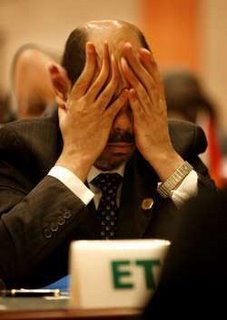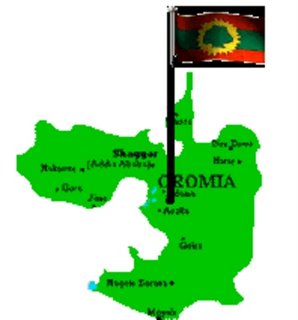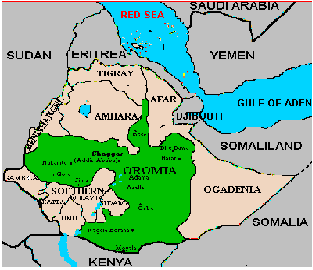2006-11-17
The European Parliament has passed a Resolution strongly critical of the Ethiopian Government’s treatment of opposition leaders and civil society activists, with particulate focus on its violent suppression of protests following the 2005 election crisis. A large number of protestors, including a UNPO Member, the Oromo community in Ethiopia, were subject to harassment, violence, and arbitrary detention, with a large number of casualties also reported.
The Resolution also calls for the full release of the official inquiry into these events, following a number of reports claiming Judges and other senior officials have been subject to intimidation and harassment whilst conducting their investigations.
The Resolution in Full:
European Parliament resolution on Ethiopia
P6_TA-PROV(2006)0501 B6-0596 , 0598 , 0600 , 0603 , 0606 and 0613/2006
The European Parliament,
– having regard to its previous resolutions on the post-election crisis and serious human rights violations in Ethiopia, in particular those of 7 July 2005 on the human rights situation in Ethiopia(1), 13 October 2005 on the situation in Ethiopia(2) and 15 December 2005 on the situation in Ethiopia and the new border conflict(3),
– having regard to Rule 115(5) of its Rules of Procedure,
A. disturbed by the arrest and expulsion from Ethiopia of two Commission officials on the alleged grounds that they tried to help Yalemzewd Bekele, a lawyer and women's rights campaigner, working for the Commission in Addis Ababa, to leave the country,
B. whereas there are reports of continuing arrests, harassment, arbitrary detention, humiliation and intimidation of opposition politicians, civil society activists, students and other ordinary citizens,
C. whereas, following high-level EU intervention on her behalf, Yalemzewd Bekele was released on 27 October 2006 after being held incommunicado for a few days,
D. whereas the Ethiopian Parliament established a government-backed Commission of Inquiry in late November 2005 with the task of investigating the June and November 2005 killings,
E. whereas the Ethiopian Government has put pressure on the members of the Commission of Inquiry to alter the findings and whereas three of the members, including the chairman and vice-chairman, have left the country after refusing government orders to alter the findings of the final report,
F. whereas the members of the Commission of Inquiry managed to leave the country with the final report, and whereas the report overwhelmingly condemns the government's handling of the crisis, which left 193 citizens dead following demonstrations in June and November 2005,
G. whereas, following the mass arrests of government opponents, human rights activists and journalists during demonstrations in June and November 2005, 111 opposition party leaders, journalists and human rights defenders are still in custody and are facing trial on charges including 'outrage against the constitution', 'inciting, organising or leading an armed rebellion' and 'attempted genocide',
H. recalling that post-election political detainees include Hailu Shawel, President of the Coalition for Unity and Democracy, Professor Mesfin Woldemariam, former Chair of the Ethiopian Human Rights Council, Dr Yacob Hailemariam, former UN Special Envoy and former prosecutor in the International Criminal Tribunal for Rwanda, Birtukan Mideksa, former judge, Dr Berhanu Nega, Mayor-elect of Addis Ababa, Netsanet Demissie, Director of the Organisation for Social Justice in Ethiopia, and Daniel Bekele, of ActionAid Ethiopia,
I. concerned at the recent arrest of Wassihun Melese and Anteneh Getnet, members of the Ethiopian Teachers' Association, and that these new arrests seem to be a response to Ethiopian Teachers' Association complaints about government interference in its activities and intimidation of its leaders,
J. whereas Prime Minister Meles Zenawi is one of the Commission's guests at the European Development Days, which are being held in Brussels from 13 to 17 November 2006,
K. whereas Ethiopia is a signatory to the ACP-EU Cotonou Agreement, Articles 9 and 96 of which stipulate that respect for human rights and fundamental freedoms is an essential element of ACP-EU cooperation,
1. Welcomes the EU's efforts to secure the release of Yalemzewd Bekele and regrets deeply the expulsion from Ethiopia of Commission officials Björn Jonsson and Enrico Sborgi;
2. Calls on the Ethiopian Government to publish unamended and in its entirety, and without any further delay, the final report of the Commission of Inquiry; calls for the relevant courts to be supplied with the report, and urges them to take due account of it so that fair trials can be conducted;
3. Calls on the Ethiopian authorities to refrain from acts of intimidation and harassment against national leaders, including court judges and members of the Ethiopian Teachers' Association, carrying out their professional obligations;
4. Calls on the Ethiopian Government immediately and unconditionally to release all political prisoners, whether journalists, trade union activists, human rights defenders or ordinary citizens, and to fulfil its obligations with respect to human rights, democratic principles and the rule of law;
5. Calls on the Ethiopian Government to disclose the total number of persons detained throughout the country, to allow visits by the International Committee of the Red Cross, and to allow all detainees access to their families, legal counsel and any medical care that their health may require;
6. Calls on the Ethiopian Government to respect the Universal Declaration of Human Rights and the African Union Charter on Human and People's Rights, including the right of peaceful assembly, freedom of opinion, and an independent judicial system;
7. Deeply regrets the Commission's invitation to Prime Minister Meles Zenawi to address the European Development Days, especially on governance issues, a decision which sends out the wrong signal with regard to EU policy on respect for human rights, democratic principles, the rule of law and good governance;
8. Asks the Council and the Commission to monitor closely the situation in Ethiopia, and considers that development cooperation programmes under the Cotonou Agreement should be contingent on respect for human rights and good governance, as clearly set out in Articles 9 and 96;
9. Calls on the Council and the Commission to explore ways of organising an all-inclusive inter-Ethiopian dialogue with the participation of political parties, civil society organisations and all stakeholders in order to work out a lasting solution to the current political crisis;
10. Instructs its President to forward this resolution to the Council, the Commission, the Ethiopian Government, the Secretary-General of the United Nations and the Chairperson of the African Union.
(1) OJ C 157 E, 6.7.2006, p. 495.(2) OJ C 233 E, 28.9.2006, p. 116.(3) Texts Adopted , P6_TA(2005)0535.
Oromo: EU Passes Resolution
2006-11-17
The European Parliament has passed a Resolution strongly critical of the Ethiopian Government’s treatment of opposition leaders and civil society activists, with particulate focus on its violent suppression of protests following the 2005 election crisis. A large number of protestors, including a UNPO Member, the Oromo community in Ethiopia, were subject to harassment, violence, and arbitrary detention, with a large number of casualties also reported.
The Resolution also calls for the full release of the official inquiry into these events, following a number of reports claiming Judges and other senior officials have been subject to intimidation and harassment whilst conducting their investigations.
The Resolution in Full:
European Parliament resolution on Ethiopia
P6_TA-PROV(2006)0501 B6-0596 , 0598 , 0600 , 0603 , 0606 and 0613/2006
The European Parliament,
– having regard to its previous resolutions on the post-election crisis and serious human rights violations in Ethiopia, in particular those of 7 July 2005 on the human rights situation in Ethiopia(1), 13 October 2005 on the situation in Ethiopia(2) and 15 December 2005 on the situation in Ethiopia and the new border conflict(3),
– having regard to Rule 115(5) of its Rules of Procedure,
A. disturbed by the arrest and expulsion from Ethiopia of two Commission officials on the alleged grounds that they tried to help Yalemzewd Bekele, a lawyer and women's rights campaigner, working for the Commission in Addis Ababa, to leave the country,
B. whereas there are reports of continuing arrests, harassment, arbitrary detention, humiliation and intimidation of opposition politicians, civil society activists, students and other ordinary citizens,
C. whereas, following high-level EU intervention on her behalf, Yalemzewd Bekele was released on 27 October 2006 after being held incommunicado for a few days,
D. whereas the Ethiopian Parliament established a government-backed Commission of Inquiry in late November 2005 with the task of investigating the June and November 2005 killings,
E. whereas the Ethiopian Government has put pressure on the members of the Commission of Inquiry to alter the findings and whereas three of the members, including the chairman and vice-chairman, have left the country after refusing government orders to alter the findings of the final report,
F. whereas the members of the Commission of Inquiry managed to leave the country with the final report, and whereas the report overwhelmingly condemns the government's handling of the crisis, which left 193 citizens dead following demonstrations in June and November 2005,
G. whereas, following the mass arrests of government opponents, human rights activists and journalists during demonstrations in June and November 2005, 111 opposition party leaders, journalists and human rights defenders are still in custody and are facing trial on charges including 'outrage against the constitution', 'inciting, organising or leading an armed rebellion' and 'attempted genocide',
H. recalling that post-election political detainees include Hailu Shawel, President of the Coalition for Unity and Democracy, Professor Mesfin Woldemariam, former Chair of the Ethiopian Human Rights Council, Dr Yacob Hailemariam, former UN Special Envoy and former prosecutor in the International Criminal Tribunal for Rwanda, Birtukan Mideksa, former judge, Dr Berhanu Nega, Mayor-elect of Addis Ababa, Netsanet Demissie, Director of the Organisation for Social Justice in Ethiopia, and Daniel Bekele, of ActionAid Ethiopia,
I. concerned at the recent arrest of Wassihun Melese and Anteneh Getnet, members of the Ethiopian Teachers' Association, and that these new arrests seem to be a response to Ethiopian Teachers' Association complaints about government interference in its activities and intimidation of its leaders,
J. whereas Prime Minister Meles Zenawi is one of the Commission's guests at the European Development Days, which are being held in Brussels from 13 to 17 November 2006,
K. whereas Ethiopia is a signatory to the ACP-EU Cotonou Agreement, Articles 9 and 96 of which stipulate that respect for human rights and fundamental freedoms is an essential element of ACP-EU cooperation,
1. Welcomes the EU's efforts to secure the release of Yalemzewd Bekele and regrets deeply the expulsion from Ethiopia of Commission officials Björn Jonsson and Enrico Sborgi;
2. Calls on the Ethiopian Government to publish unamended and in its entirety, and without any further delay, the final report of the Commission of Inquiry; calls for the relevant courts to be supplied with the report, and urges them to take due account of it so that fair trials can be conducted;
3. Calls on the Ethiopian authorities to refrain from acts of intimidation and harassment against national leaders, including court judges and members of the Ethiopian Teachers' Association, carrying out their professional obligations;
4. Calls on the Ethiopian Government immediately and unconditionally to release all political prisoners, whether journalists, trade union activists, human rights defenders or ordinary citizens, and to fulfil its obligations with respect to human rights, democratic principles and the rule of law;
5. Calls on the Ethiopian Government to disclose the total number of persons detained throughout the country, to allow visits by the International Committee of the Red Cross, and to allow all detainees access to their families, legal counsel and any medical care that their health may require;
6. Calls on the Ethiopian Government to respect the Universal Declaration of Human Rights and the African Union Charter on Human and People's Rights, including the right of peaceful assembly, freedom of opinion, and an independent judicial system;
7. Deeply regrets the Commission's invitation to Prime Minister Meles Zenawi to address the European Development Days, especially on governance issues, a decision which sends out the wrong signal with regard to EU policy on respect for human rights, democratic principles, the rule of law and good governance;
8. Asks the Council and the Commission to monitor closely the situation in Ethiopia, and considers that development cooperation programmes under the Cotonou Agreement should be contingent on respect for human rights and good governance, as clearly set out in Articles 9 and 96;
9. Calls on the Council and the Commission to explore ways of organising an all-inclusive inter-Ethiopian dialogue with the participation of political parties, civil society organisations and all stakeholders in order to work out a lasting solution to the current political crisis;
10. Instructs its President to forward this resolution to the Council, the Commission, the Ethiopian Government, the Secretary-General of the United Nations and the Chairperson of the African Union.
(1) OJ C 157 E, 6.7.2006, p. 495.(2) OJ C 233 E, 28.9.2006, p. 116.(3) Texts Adopted , P6_TA(2005)0535.
Link to European Parliament Text


